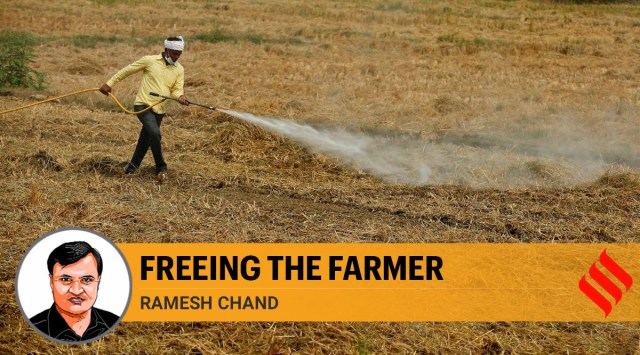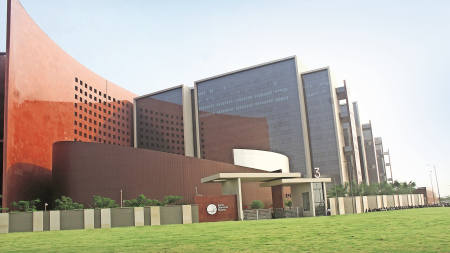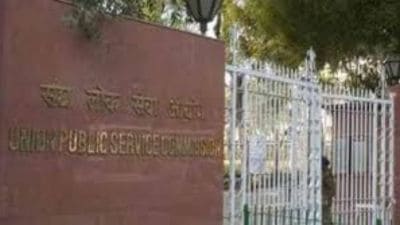- India
- International
FPTC Act will put pressure on APMC markets to become competitive
Farmers’ Produce Trading and Commerce Act 2020 only threatens rent-seeking by APMC, mandis under the cover of regulation.
 A farmer tends to his field on the outskirts of New Delhi. (Express Photo: Praveen Khanna)
A farmer tends to his field on the outskirts of New Delhi. (Express Photo: Praveen Khanna)The debate on the Farmers’ Produce Trading and Commerce Act 2020 (FPTC Act) has seen some misinformation and qualms among stakeholders, especially farmers in some states. It is imperative to understand the background and intentions underlying the new farm laws and put their implications and scope in perspective rather than being guided by the imaginary, ideological and vested narratives.
From the 1960s, there have been concerted efforts to bring all wholesale markets for agricultural produce in various states under the Agriculture Produce Market Regulation (APMC) acts. All states, except Kerala, Jammu and Kashmir and Manipur, enacted such laws. The APMC Acts mandated that the sale/purchase of agricultural commodities is carried out in a specified market area, and, producer-sellers or traders pay the requisite market fee, user charges, levies and commissions for the commission agents (arhtiyas). These charges were levied irrespective of whether the sale took place inside APMC premises or outside it and the charges varied widely across states and commodities.
In the initial years, APMC acts helped remove malpractices and freed the farmers from the exploitative power of middlemen and mercantile capital.
The golden period for APMC markets lasted till around 1991. With time, there was a palpable loss in growth in market facilities and by 2006, it had declined to less than one-fourth of the growth in crop output after which there was no further growth. This increased the woes of Indian farmers as market facilities did not keep pace with the increase in output and regulation did not allow farmers to sell outside APMC markets. The farmers were left with no choice but to seek the help of middlemen. Due to poor market infrastructure, more produce is sold outside markets than in APMC mandis. The net result was a system of interlocked transactions that robs farmers of their choice to decide to whom and where to sell, subjecting them to exploitation by middlemen.
Over time, APMC markets have been turned from infrastructure services to a source of revenue generation. In several states, commission charges were increased without any improvement in the services. And to avoid any protests from farmers against these high charges, most of these were required to be paid by buyers like the FCI. In Haryana and Punjab, mandi fees and rural development charges for wheat and non-basmati rice purchased by FCI are four to six times the charges for basmati rice purchased by private players. This not only results in a heavy burden on the Centre but also increases the logistics cost for domestic produce and reduces trade competitiveness.

Opinion | Farm bills: Politics now threatens to complicate the process
These drawbacks were recognised by experts and stakeholders and pressure started mounting for changes in market regulations. Successive governments at the Centre made repeated attempts to persuade the states to make appropriate changes in their APMC acts. But for 18 long years, the progress in reforms remained slow. The only choice for the Union government was either to ignore its responsibility towards farmers or use the constitutional route to address long-pending issues of market reforms.
The FPTC Act gives farmers the freedom to sell and buy farm produce at any place in the country — in APMC markets or outside the mandated area — to any trader, like the sale of milk. The Act also allows transactions on electronic platforms to promote e-commerce in agriculture trade.
The effect of the FPTC Act on APMC mandis will depend on the treatment meted out to the mandis and the charges and levies therein. Out of the 25 states with APMC acts, no commission is levied under the Act on notified crops in 12 states. Service charges like mandi fees on major crops in these states vary from zero per cent to one per cent in nine states and it is two per cent in Madhya Pradesh and Tripura. There is no threat from the FPTC Act to APMC mandis and their business in these states as private traders and sellers will get benefits commensurate with the mandi charges.
The second category of states — Andhra Pradesh, Himachal Pradesh, Maharashtra and Telangana — is where service charge for mandis is one per cent of the value of produce and commission varies from one to two per cent. Uttarakhand also comes in this category. Karnataka follows these states closely, with total charges at 3.5 per cent. These states can easily bring down mandi charges to 2 per cent or less.
The third set of states includes Punjab, Haryana, Rajasthan, Gujarat, Arunachal Pradesh, West Bengal and Uttar Pradesh, where the total charges, including commission, varies from five to 8.5 per cent, the highest being in Punjab followed by Haryana. Punjab and Haryana will not face any challenge from sale outside of mandis as long as paddy and wheat are the dominant crops and are procured by the government. It is in the long-term interest of these states to bring down market charges and commissions to 2 per cent or less to enable APMC mandis to compete with sales outside their premises.
Opinion | Agricultural bills will provide legal framework for contract-farming
The real threat in some states to APMC mandis and their business is from excessive and unjustified charges levied under the APMC acts. The FPTC Act will only put pressure on APMC markets to become competitive. Discussion with mandi officials reveals that a maximum 1.5 per cent of total charges, distributed between market fee and commission, are adequate to maintain and run mandis. This will not wean away traders from APMC markets as they will receive the benefits of mandi infrastructure, bulk produce available in one place and save costs required for individual transactions outside the market. The states which are actually interested in farmers’ welfare should keep mandi charges below a reasonable level of 1.5 per cent. This will ensure the co-existence of APMC mandis and private channels permitted under the new Act in a true competitive spirit.
This article first appeared in the print edition on October 24, 2020 under the title ‘Freeing the farmer’. The writer is member, Niti Aayog. Views are personal.
40 Years Ago
EXPRESS OPINION
More Explained
Apr 16: Latest News
- 01
- 02
- 03
- 04
- 05









































